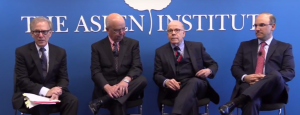 April 13 — Thursday was yap day for three former intelligence heads and the present CIA director who spoke at two different think tank forums in D.C.
April 13 — Thursday was yap day for three former intelligence heads and the present CIA director who spoke at two different think tank forums in D.C.
“WikiLeaks walks like a hostile intelligence service and talks like a hostile intelligence service. It has encouraged its followers to find jobs at CIA in order to obtain intelligence,” Pompeo claimed and threatened that unnamed actions will soon be taken against the website. (More here.)
While the former heads skirted around a swampy skepticism shrouding the U.S. intelligence community in recent years, newly installed CIA director Mike Pompeo boasted of the nation’s lead intel agency’s effectiveness while punching out Wikileaks as a dire threat to the nation’s secrecy.
It may have been a loosely coordinated charm offensive to better position the sprawling intelligence community as the IC guys chatted in a clubby, almost bromantic manner, first at the Aspen Institute and then later at Johns Hopkins School of Advanced International Studies only a few blocks away.
The Problem Child Shows Little Potential
Those on the Aspen Institute panel heavily criticized Donald Trump’s lack of understanding about intelligence agencies almost in the manner of school principals and headmasters complaining about a problem student with little potential.
Trump’s shortcomings on the campaign trail reflected “a person spectacularly unprepared to be president, certainly when it came to intelligence,” said John McLaughlin, a former high-level CIA and State Department veteran.
McLaughlin framed out four phases of the mercurial president’s learning curve. The first two: ignorance and hostility leading up to Trump’s first weeks in the White House. More recently, the third phase is a recognition that intelligence is unavoidable and necessary in understanding recent events in North Korea and Syria.
Phase four all depends on what ongoing intelligence investigations may unearth regarding possible coordination that Trump and company may have had with Russia’s election meddling. That, said McLaughlin, “could produce something startling, interesting that could throw…this whole thing back into the trees.”
Moderator David Ignatius, Washington Post columnist and spy novelist, noted at the beginning of the event the tweeting president’s controversial claim that his campaign had been under surveillance by the IC.
How much damage has been done when President Trump complained about intelligence leaks about the Russian investigation, Ignatius asked, where the president asked in early January, “Intelligence agencies should never have allowed this fake news to ‘leak’ into the public. One last shot at me. Are we living in Nazi Germany?”
“It was substantial damage,” Michael Hayden remarked. The former director of the NSA and CIA added that if Trump begins to show more maturity he “would not call it irrecoverable.”
Confidence in Trump’s Appointments
All the panelists conceded that the 70-year-old Trump, a former TV reality show celebrity and self-avowed Tic Tak-eating, pussy-grabbing gadzillionaire, has made some strong appointments. Defense Secretary James Mattis and National Security Advisor H. R. McMaster were praised as being strong hands that Trump can rely on.
There was also some talk about Vice President Mike Pence as being a possible bridge to communicating important information to Trump.
Juan C. Zarate, a former deputy national security adviser to President G. W. Bush, said he has “seen a maturation of personnel, maturation of policy and maturation of awareness.” Zarate was the lone voice is viewing the intelligence community as operating in “a time of great cynicism,” and cautioned that Trump’s leadership approach may help or hinder that.
“Intelligence enables action in the face of doubt,” he said. “If you’re creating additional doubt or misperception about your own community to work, that disables your ability to do things.”
Little discussion took place about what role the intelligence agencies have played in their own loss of trust by Trump and much of the country. The IC has been reaching for a revitalized credibility ever since the invasion and occupation of Iraq only to be rocked back on its heels repeatedly. Sweeping leaks about massive electronic surveillance programs released by former NSA contractor Edward Snowden in May 2013 have been followed salvos from Wikileaks. Revelations of the CIA hacking Senate computers and Donald Trump’s snarky and combative comments have only added to skepticism among the U.S. public that intel agencies sometimes overstep their mandate and have become motivated by politics.
‘Deep State’ a Fleeting Notion
Ignatius did not press the three panelists about the seemingly unremitting leaks about investigations of Trump and company. But the three did reject the specter of a “deep state” within the government.
“Sophomoric ideas when people can’t explain what’s going on around them,” McLaughlin.
He predicted that “deep state” allegations will “fade as a footnote over time…. as sensible people in the administration gain traction and become important to the president, the idea of the deep state will just recede as an artifact of this early weird period when this extraordinarily unique president was maturing.”

